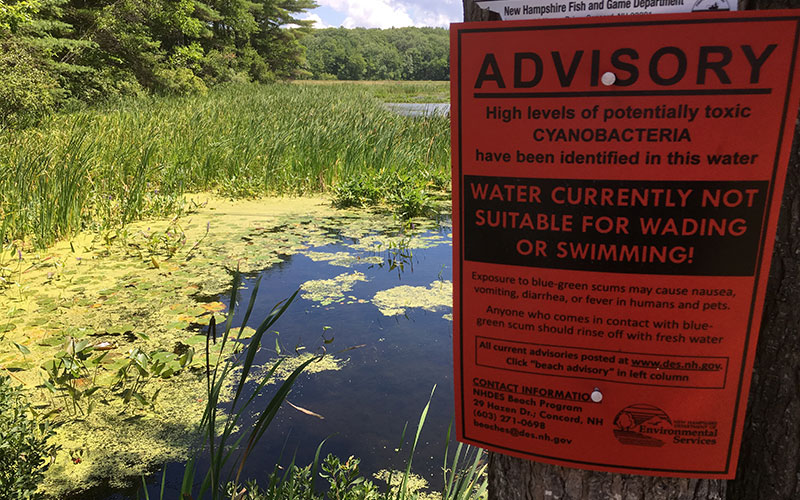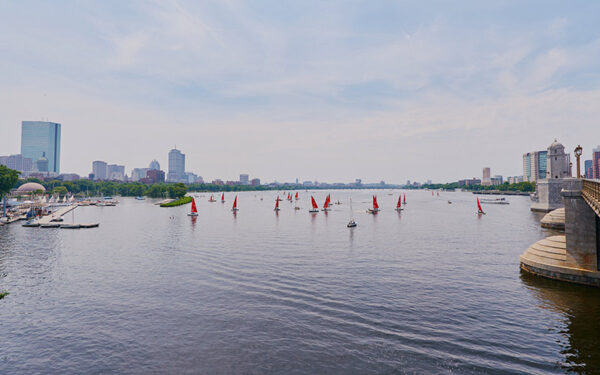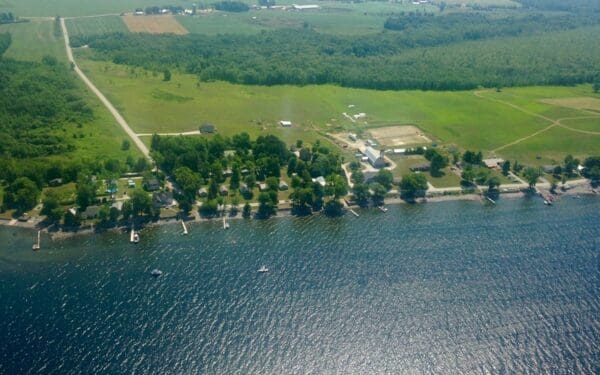
Jones Pond, part of the Merrymeeting River, isn’t safe for recreational activities because of an outbreak of blue-green algae. To curtail the pollution that causes these outbreaks, CLF is holding New Hampshire's Fish & Game Department accountable. Photo: Tom Irwin
Decades ago, Fred Quimby taught his children how to fish and canoe in Jones Pond near his home in New Durham, New Hampshire. But this year, Fred had to go someplace else to teach his grandchildren to fish.
That’s because Jones Pond, part of the Merrymeeting River, has suffered yet another outbreak of cyanobacteria – also known as blue-green algae – causing the state to issue a warning that the water isn’t safe for wading (let alone swimming) or other recreational activities.
And Jones Pond isn’t alone. Marsh Pond, also a part of the Merrymeeting River, is the subject of a similar advisory, as was Downing Pond in 2015 and 2016.
The cause of the problem is pollution, and the source of that pollution is the New Hampshire Fish & Game Department’s Powder Mill Fish Hatchery. The largest of the state’s hatcheries, the facility is discharging significant amounts of phosphorus and other pollution – from fish food and fish waste – into the Merrymeeting River. All that pollution is taking a toll. Portions of the river have been deemed impaired as a result of cyanobacteria, and people who normally boat, swim and fish in its waters have at times been forced to stay out.
The Merrymeeting River also carries phosphorus downstream into Alton Bay, a popular boating, fishing, and swimming spot in iconic Lake Winnipesaukee. If the Powder Mill Fish Hatchery doesn’t clean up its act, outbreaks of blue-green algae and other water quality problems could spread to Alton Bay.
And whether occurring in the Merrymeeting River or Lake Winnipesaukee, the adverse effects of blue-green algae outbreaks can go beyond ruining a summer day on the water.
The Dangers of Blue-green Algae
As the warnings now posted at Jones and Marsh Ponds make clear, blue-green algae is a public health concern, putting the health of people and pets at risk.
Blue-green algae can produce toxins that cause symptoms ranging from vomiting to fever to skin rashes. A growing body of research also shows a link between exposure to certain toxins produced by blue-green algae and neurodegenerative diseases such as Alzheimer’s, Parkinson’s, and Lou Gehrig’s disease.
Living next door to toxic algae has already taken its toll on the people of New Durham. Unsuspecting swimmers have suffered from extensive rashes, and a pet cat who drank from one of the contaminated ponds died less than 24 hours later.
Blue-green algae blooms also harm wildlife, depleting waters of oxygen levels needed to sustain fish.
Solving the Problem
It’s unacceptable that in the heart of the summer, people who would like to swim, fish, and boat in our local waters are forced to stay out. And it’s unacceptable that a state-run facility designed to produce fish to be stocked elsewhere in the state is causing this problem.
That’s why CLF is pursuing an enforcement action against the Fish & Game Department for violations of the Clean Water Act. As the first step in this process, on Aug. 2 we formally notified the agency of our intent to initiate a citizen suit in federal court.
Our goal? Require the Powder Mill Fish Hatchery to stop violating the Clean Water Act and restore the health of the Merrymeeting River, and ensure that problems in the Merrymeeting River don’t spread downstream into Lake Winnipesaukee.
CLF is fighting to ensure our waters are fishable and swimmable. We’re fighting so that New Hampshire residents like Fred Quimby can keep enjoying the summer activities they love – such as teaching their grandchildren how to fish and appreciate our precious rivers and lakes.



